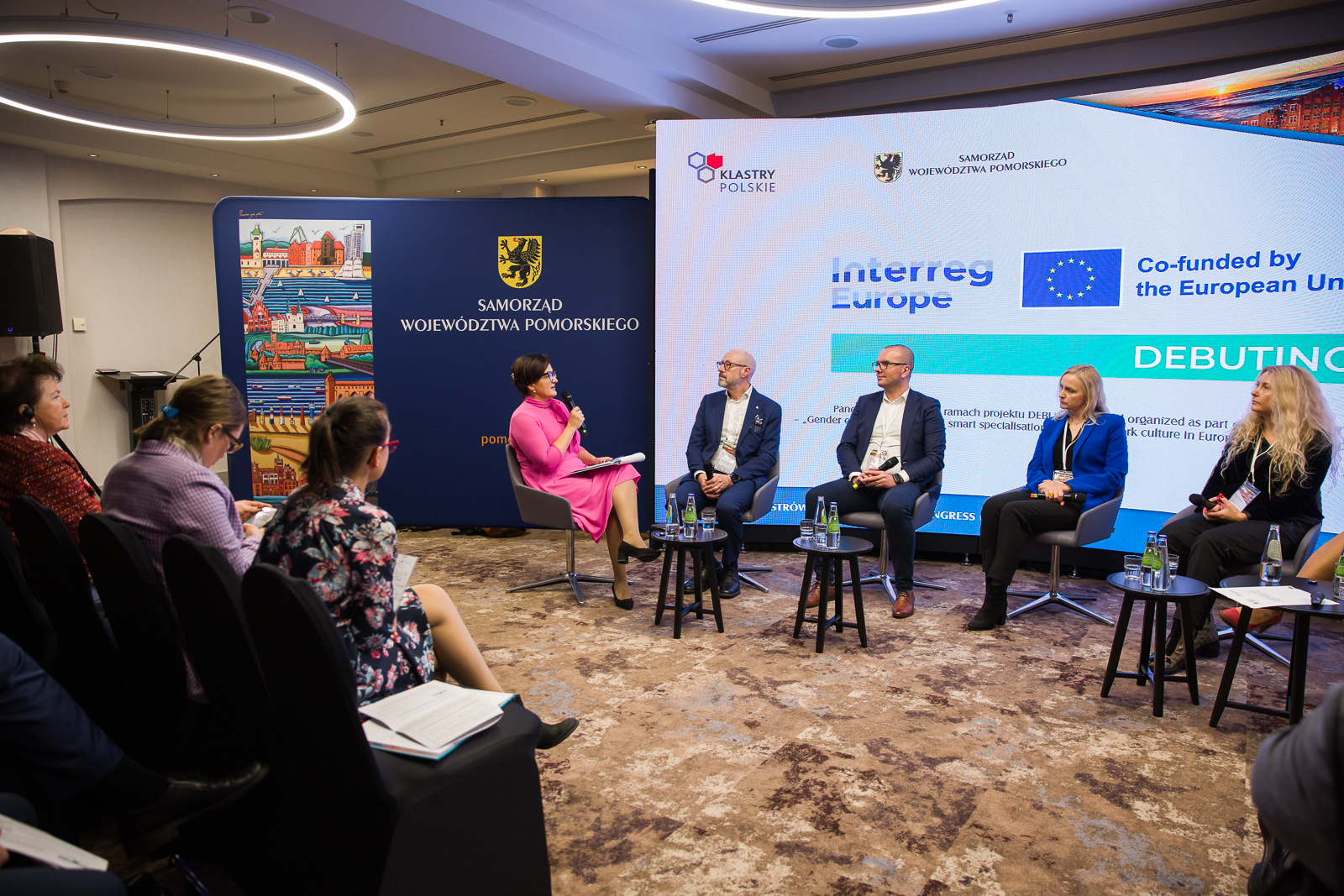Outcomes from a panel discussion on clusters and gender equality

The 9th Congress of Polish Clusters took place on November 9th 2023 in Gdansk. One highlight of the program was the panel Clusters as Creators of New Business Models Considering Inclusiveness and Gender Equality, that was implemented as part of the DEBUTING project, covering also benefits for businesses from increased gender equality in workplaces.
Anders Olsson gave a presentation about the Värmland region. In the context of equality between women and men, in this region, as in the entire European Union, disproportions are still visible: 87% of CEOs are men, as are 81% of supervisory board members, women earn €5,500 less per year, even though they are better educated (50% of women and only 30% of men have higher education). Even though Värmland was the first region in Europe to have gender equality included in the Regional Innovation Strategy, the pace of equalizing opportunities is still too slow.
Anders also pointed out how important the method of communication is. He gave the example of the forest industry, which, according to managers, is not very popular among women in terms of working there. However, when the opportunity to work in this sector was announced, as many as 200 women signed up for an information event. Anders speculated that this could be an early signal that there will be a transition in the near future where many more women are applying to the industry because the industry has made its home work and adapted workplaces and developed a more attractive culture that values women's contribution. He also highlighted the importance of the regional project Attraktonskraft Värmland where cluster staff and company leaders in Värmland are trained in how to work for gender equality and increased diversity, and what potential it has to contribute to better health, innovation and profitability.
The discussion participants briefly described the issue of equal rights for women and men in the areas of their professional work. Poland's situation compared to Europe is relatively good:
- The pay gap between women and men in terms of median earnings in Poland (10%) is one of the lowest in the OECD (OECD average is 16%).
- The gender pay gap in Poland, according to data from the European Commission, is 4.5, and the average in the EU is 13 - this is the difference between the average gross hourly earnings of men and women expressed as a % of men's gross pay.
- Female scientists from the University of Gdańsk constitute 56% of the authors of publications (fourth place in the world according to the Leiden Report).
- According to The Times Higher Education Impact ranking, the University of Gdańsk ranks first in Poland and 13th in the world in terms of activities implemented at the university for gender equality and involvement in the recruitment and promotion of women.
In the IT sector, the change related to the greater involvement of women is already very visible, both in Poland and in the Pomeranian Voivodeship there are many initiatives encouraging women to follow this career path (e.g. the WOMANIZE IT project, implemented by the Interizon cluster). However, some other, often more traditional sectors, are still lagging behind. The Starter Incubator also implements several initiatives aimed at supporting women in industries traditionally perceived as "male".
The situation is similar in Lithuania - in the IT and agrifood sectors there is a high domination of men, but, similarly to Poland, there are also many initiatives aimed at equalizing these proportions. Participants agreed that women should be encouraged to work in male-dominated professions, but the opposite should also be true for more men to apply for female dominated industries. Men should also be encouraged to take paternity leave.
During the discussion, the role of the Pomeranian Team for Women operating at the Marshal of the Pomeranian Voivodeship was also emphasized, whose aim is to raise awareness of equal treatment in terms of work, pay and professional advancement of women. Its task is to collect data on the situation of women in the Pomeranian Voivodeship and create recommendations in various areas: labour market, education, health and social.
The last question during the panel concerned the business benefits resulting from the introduction of gender equality in workplaces. The panelists emphasized that working with a diverse team always introduces new quality and has a positive impact on the innovativeness of ideas. An inclusive approach sends a signal to future generations that everyone can find their place in a given profession and will be welcome, and research shows that even men who work in more gender-diverse teams are happier.
The panel was summed up by Marek Przeor, Team Leader at the European Commission (DG GROW), who stated that, according to research conducted, only 35% of cluster managers are women. So we still have work to do in this respect and need to put the learnings of DEBUTING at the service of policy improvement!